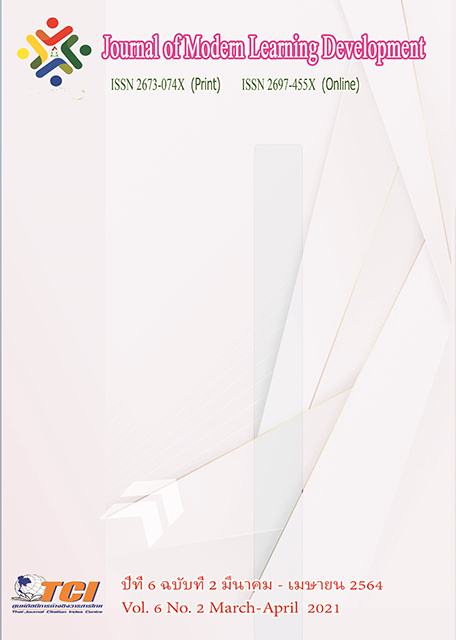Leadership Development Based on iv Iddhipada-Dhammas of Basic Education School Administrator Under Khonkaen Primary Educational Service Area Office 2
Main Article Content
Abstract
The objectives of this research paper were: to study the strategic leadership of the school administrators in accordance with the Four Iddhipāda Dhammas; to present the suggestions for the strategic leadership of the school administrators in accordance with the Four Iddhipāda Dhammas under the Khon Kaen Primary Educational Service Area Office 2. The samples of this research included 319 school administrators and teachers,The research instrument was the questionnaire and interview. The statistics used in data analysis were: Percentage, Mean and Standard Deviation.
The research results were as follows:
1. The overall mean score of the strategic leadership of the school administrators in accordance with the Four Iddhipāda Dhammas under the Khon Kaen Primary Educational Service Area Office 2. The most practical aspect was seen in that of the revolutionary thinking, followed by that of prediction and future determination. The least practical aspect was seen in that of perceiving, understanding, holistically and strategically thinking.
2. The guidelines are as follows: 1) perceiving, understanding, holistically and strategically thinking, the administrators should recognize and understand to information related to administration to determine the direction of the organization; 2) creating a strategy with various imagination, administrators should take the information system to support in management give for teachers to participate in strategy formulation; 3) prediction and future determination, administrators should consider long-term results such as knowledge management, building a knowledge base to develop the school into a learning organization; 4) revolutionary thinking, the administrators should bring the PDCA process to improve the quality of the school to the full potential; 5) creating a vision, the administrators should set a vision linked to the present and the future and they must be a far-sighted person, consistent with needs and social change.
Article Details
References
กล้าศักดิ์ จิตต์สงวน. (2555). “รูปแบบการพัฒนาภาวะผู้นำเชิงกลยุทธ์สำหรับผู้บริหารโรงเรียนมัธยมศึกษา”.วิทยานิพนธ์ปริญญาดุษฎีบัณฑิต. สาขาบริหารการศึกษา คณะครุศาสตร์. บัณฑิตวิทยาลัย: จุฬาลงกรณ์มหาวิทยาลัย.
เจ้าอธิการบุญ ช่วยโชติวํโส และ สุนทร สายคำ. (2562). ภาวะผู้นาตามหลักธรรมาภิบาลของผู้บริหารสถานศึกษาขั้นพื้นฐานอำเภอเมืองขอนแก่น จังหวัดขอนแก่น. ขอนแก่น: เอมี่ ก๊อปปี้ เซนเตอร์.
พระมหาขวัญยืน สุทนฺโต. (2560). รูปแบบการพัฒนาภาวะผู้นำเชิงกลยุทธ์ตามแนวพุทธวิธีสำหรับผู้บริหารสถานศึกษาขั้นพื้นฐาน. วารสารมนุษยศาสตร์และสัมคมศาสตร์ มหวิทยาลัยราชภัฎอุบลราชธานี. ปีที่ 8 ฉบับพิเศษ. 312-329
พัชรี ชำนาญศิลป์ และคณะ. (2558). การพัฒนาภาวะผู้นำเชิงพุทธของผู้บริหารวิทยาลัยการอาชีพเขตภาคเหนือตอนล่าง. วารสาร มจร สังคมศาสตร์ปริทรรศน์. 4 (3), 75-90
มันทนา กองเงิน. (2554). “ภาวะผู้นำเชิงกลยุทธ์กับการจัดการความขัดแย้งของผู้บริหารในสถานศึกษาขั้นพื้นฐาน สังกัดสำนักงานเขตพื้นที่การศึกษาประถมศึกษานครปฐมเขต 1”. วิทยานิพนธ์ปริญญาศึกษาศาสตรมหาบัณฑิต. สาขาการบริหารการศึกษา คณะศึกษาศาสตร์. บัณฑิตวิทยาลัย: มหาวิทยาลัยศิลปากร.
วรวรรษ เทียมสุวรรณ และคณะ. (2562). ภาวะผู้นำเชิงกลยุทธ์ในศตวรรษที่ 21. วารสารบัณฑิตวิทยาลัยวิทยาลัยมหาวิทยาลัยสวนดุสิต. 15 (2), 219-231
สัมฤทธิ์ กางเพ็ง และสรายุทธ กันหลง. (2555). ภาวะผู้นำแบบโลกาภิวัตน์: แนวคิดเชิงทฤษฎี.“เอกสารประกอบการสอนรายวิชาภาวะผู้นำ”. มหาวิทยาลัยจุฬาลงกรณ์ราชวิทยาลัย วิทยาเขตขอนแก่น.
สำนักงานคณะกรรมการพัฒนาเศรษฐกิจและสังคมแห่งชาติ. (2554). แผนพัฒนาเศรษฐกิจและสังคมแห่งชาติ ฉบับที่สิบเอ็ด พ.ศ. 2555 – 2559. กรุงเทพมหานคร: สหมิตรพริ้นติ้งแอนพับลิสซิ่ง.


